The difference between Semrush and Ahrefs is key for anyone looking to boost their website’s performance.
Both tools offer great SEO features like keyword tracking, site ranking, and checking out what the competition is doing. But, they each have their own special perks.
We’ve broken down how Semrush and Ahrefs stack up in terms of cost, what they can do, how easy they are to use, and the support they offer, helping you pick the right one for your needs.
- What’s the Difference Between Semrush and Ahrefs?
- Core Functionalities and User Interface: Semrush vs. Ahrefs
- Keyword Research and Analysis: Semrush vs. Ahrefs
- Backlink Analysis and Site Audit Features: Semrush vs. Ahrefs
- Content Marketing and Social Media Tools: Semrush vs. Ahrefs
- Semrush vs. Ahrefs: Assessing Pricing, ROI, Customer Support, and Community Resources
- Summarizing the Pros and Cons of Semrush and Ahrefs
- Elevate Your Digital Presence with Flying V Group’s Expert Guidance
- FAQs
What’s the Difference Between Semrush and Ahrefs?
The difference between Semrush and Ahrefs – both esteemed SEO tools in digital marketing – is that they cater to different needs and preferences.
Semrush is widely recognized for its comprehensive approach, offering an extensive range of features that cover everything from keyword research and competitor analysis to social media and PPC campaign management.
Ahrefs, on the other hand, is celebrated for its robust backlink analysis and site auditing capabilities, making it a favorite for SEO professionals focused on link-building and technical site health.
Below, we delve into a detailed discussion on the distinctive aspects of these two SEO powerhouses, highlighting how each can uniquely benefit your marketing strategies.
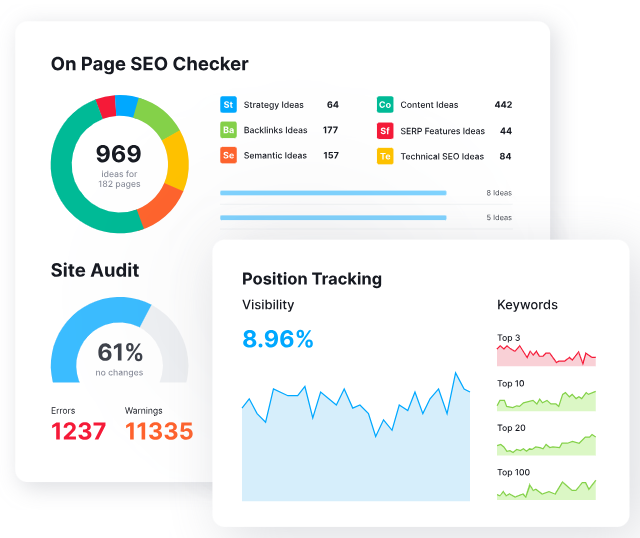
Core Functionalities and User Interface: Semrush vs. Ahrefs
When comparing Semrush and Ahrefs, their user interfaces and core functionalities significantly influence user preference and effectiveness. Here’s a quick glance at how they stack up against each other:
|
Feature |
Semrush |
Ahrefs |
| User Interface | Intuitive and user-friendly with a comprehensive dashboard. | Clean and straightforward, known for its ease of navigation. |
| Learning Curve | Moderate, with extensive features requiring some learning. | Relatively easy, especially for users focused on backlinks and site audits. |
| Customization | Highly customizable reports and dashboards. | Customizable, but with a focus on simplicity and efficiency. |
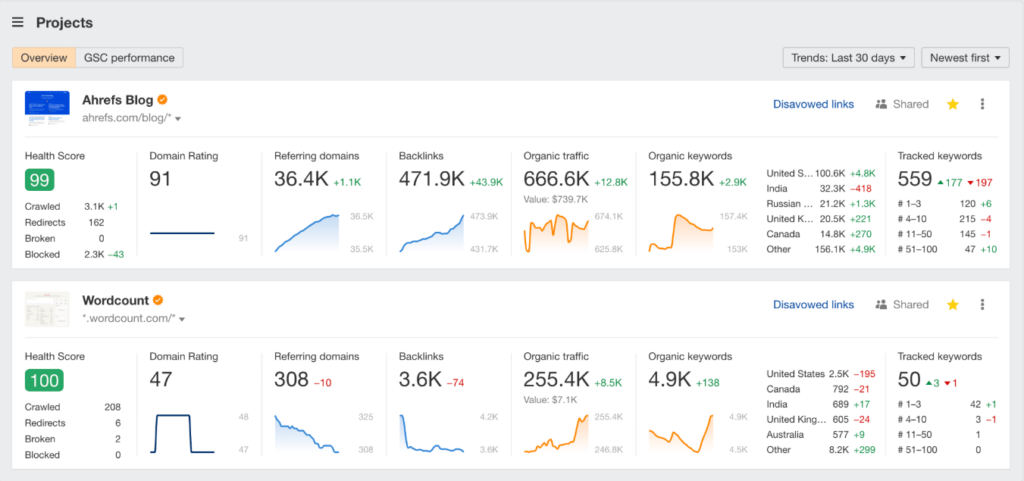
Analysis of Core SEO Functionalities:
- Semrush:
-
-
- Extensive keyword research tools with a vast database.
- Detailed competitor analysis including advertising strategies.
- Site audits covering a wide range of SEO issues.
- Social media tracking and PPC analysis.
- Content marketing tools with writing assistant and SEO content template.
-
- Ahrefs:
-
- Strong backlink analysis tools with an expansive link database.
- Comprehensive site audit focusing on technical SEO.
- Keyword research geared towards finding content gaps and opportunities.
- Competitor tracking with a focus on backlink profiles.
- Intuitive rank tracking for monitoring keyword positions.
Both tools offer robust SEO functionalities but differ in their focus areas and user interface designs, catering to varied user preferences and requirements.
Keyword Research and Analysis: Semrush vs. Ahrefs
Regarding keyword research and analysis, both Semrush and Ahrefs offer powerful capabilities, each with their unique strengths. Here’s a closer look at how they compare in this critical area:
Semrush:
- Keyword Database: Offers an expansive keyword database with over 20 billion keywords.
- Keyword Discovery: Provides a range of keyword research tools, including Keyword Magic Tool and Keyword Overview.
- Competitor Keyword Analysis: Allows in-depth analysis of competitors’ keyword strategies.
- Keyword Difficulty Score: Offers a comprehensive keyword difficulty score to evaluate competitiveness.
- SERP Analysis: Includes detailed SERP analysis for each keyword, giving insights into search results.
- Trend Analysis: Trends feature helps to track keyword popularity over time.
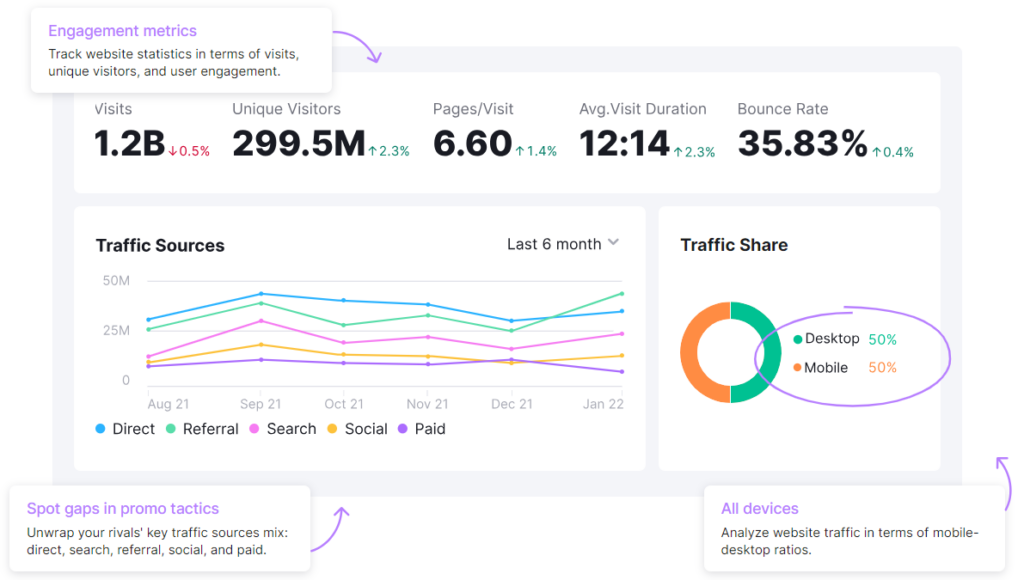
Ahrefs:
- Keyword Database: Known for its extensive database with a strong focus on backlink data.
- Keyword Explorer: Offers a Keyword Explorer tool for in-depth keyword research and suggestions.
- Competitor-Based Keyword Research: Strong capabilities in uncovering competitors’ keywords.
- Keyword Difficulty Rating: Provides a reliable keyword difficulty rating for SEO planning.
- Click Metrics: Includes click metrics to estimate the potential traffic for keywords.
- Content Gap Tool: Unique content gap tool to find keywords your competitors rank for but you don’t.
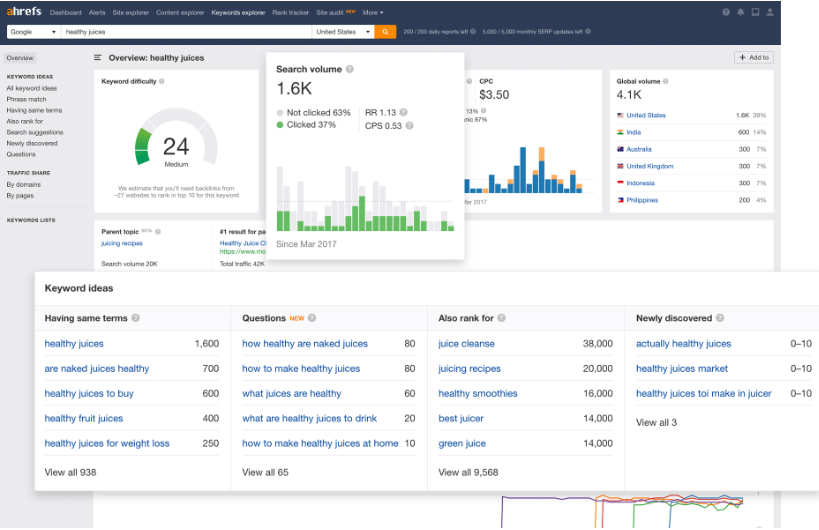
Both Semrush and Ahrefs excel in keyword research and analysis, but their approaches differ. Semrush provides a more comprehensive set of tools for varied keyword research needs, while Ahrefs focuses on in-depth exploration and competitor analysis.
Backlink Analysis and Site Audit Features: Semrush vs. Ahrefs
In SEO, backlink analysis and site audits are pivotal for ensuring a website’s robust health and performance. Semrush and Ahrefs both bring distinct features to the table in these areas. Both tools offer strong capabilities, but with a different focus:
| Feature |
Semrush |
Ahrefs |
| Backlink Analysis | Extensive analytics with a focus on backlink types and quality | Deep dive into backlink profiles with an emphasis on link quality |
| Site Audit | Comprehensive scanning for a wide range of SEO issues | Detailed analysis with a user-friendly approach to SEO issue identification |
| Toxic Link Identification | Robust tool for identifying and managing toxic backlinks | Focuses more on overall backlink quality and health |
| Issue Prioritization | Prioritizes SEO issues for efficient resolution | Offers a straightforward breakdown of all site issues |
Ultimately, the choice between Semrush and Ahrefs for backlink analysis and site audits depends on specific needs: Semrush offers a more diversified approach, while Ahrefs provides depth, especially in backlink data.
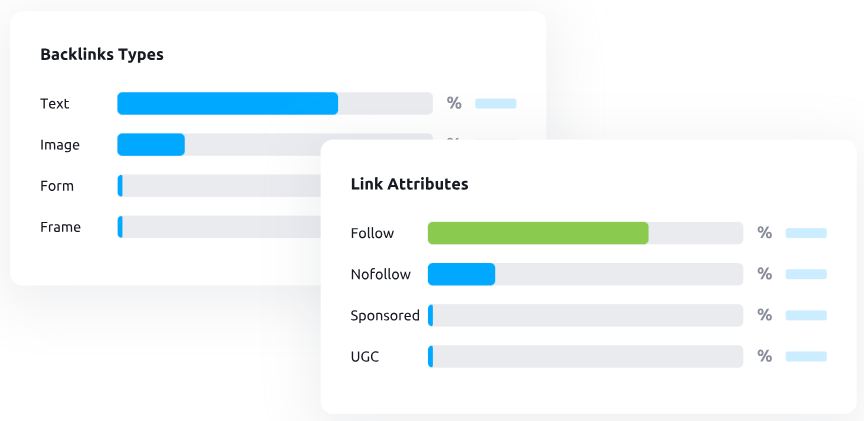
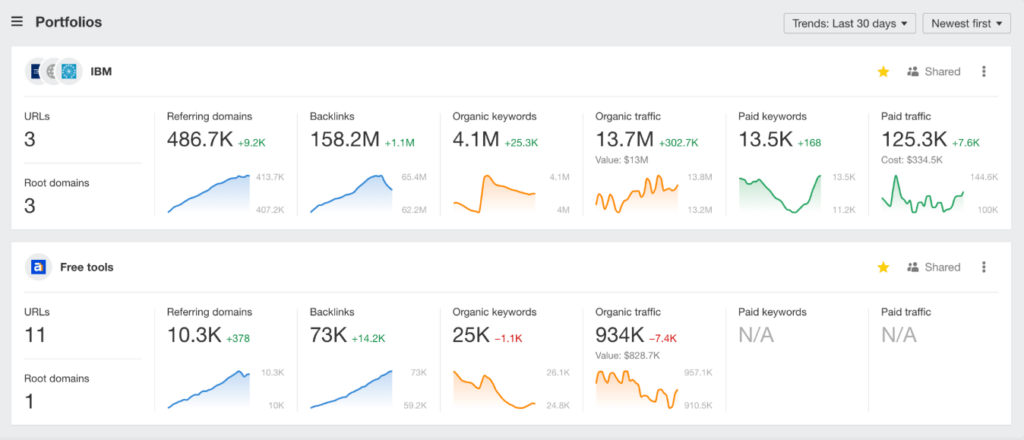
Content Marketing and Social Media Tools: Semrush vs. Ahrefs
Content marketing and social media integration are crucial to a comprehensive digital marketing strategy. Semrush and Ahrefs offer distinct tools and features in these domains:
|
Feature |
Semrush |
Ahrefs |
Comments |
| Topic Research | Extensive | Limited | Semrush offers more in-depth topic research for content planning. |
| Content Audit | Available | Not available | Semrush allows a comprehensive content audit, while Ahrefs lacks this feature. |
| SEO Content Template | Yes | No | Semrush provides templates for optimizing content for SEO. |
| Brand Monitoring | Yes | No | Semrush tracks brand mentions across the web, not offered by Ahrefs. |
| Content Gap Analysis | Yes | Yes | Both tools offer content gap analysis for identifying content opportunities. |
| Social Media Campaign Management | Complete | None | Semrush offers tools for managing social media campaigns, Ahrefs does not. |
| Social Media Posting | Yes | No | Semrush allows direct posting to social platforms, Ahrefs lacks this functionality. |
| Social Media Analytics | Detailed | Basic | Semrush provides in-depth social media analytics, Ahrefs offers basic performance analysis of content on social media. |
Semrush shines with a comprehensive set of content marketing tools and robust social media integration, making it ideal for marketers focusing on content creation and social media management.
Ahrefs, while strong in SEO aspects, offers limited features in content marketing and lacks dedicated social media tools. Its focus remains on SEO-driven content planning and backlink analysis.

Semrush vs. Ahrefs: Assessing Pricing, ROI, Customer Support, and Community Resources
In the quest to choose the right SEO tool, pricing, and customer support are as critical as the tool’s features. This section compares Semrush and Ahrefs in terms of pricing, value for money, customer support quality, and the resources available for community learning.
|
Aspect |
Semrush |
Ahrefs |
Comments |
| Pricing Structure | Multiple tiers
(Pro – $129.95 Guru – $249.95 Business – $499.95 |
Multiple tiers (starting at)
Lite – $99 Standard – $199 Advanced – $399 Enterprise – $999 |
Both offer tiered pricing, catering to different user needs. |
| Cost-Effectiveness | High | Moderate | Semrush offers a wider range of features per pricing tier, providing more value. |
| Free Version/Trial | Yes (Limited) | No | Semrush offers a free version with basic capabilities, while Ahrefs does not. |
| ROI Potential | High | Moderate | Semrush’s extensive features can lead to a higher ROI. |
| Annual Discount | Available | Available | Both platforms offer discounts on annual subscriptions. |
| Customer Support Quality | Excellent | Good | Semrush is known for its responsive and helpful customer support. |
| Learning Resources | Extensive | Adequate | Semrush provides more comprehensive learning resources than Ahrefs. |
| Community Engagement | Active | Active | Both platforms have active communities, but Semrush offers more regular webinars and community events. |
Summarizing the Pros and Cons of Semrush and Ahrefs
This comparison offers a quick overview of the primary strengths and limitations of Semrush and Ahrefs, assisting users in making an informed choice based on their specific SEO and digital marketing requirements.
Semrush
- Pros:
- Comprehensive suite covering SEO, PPC, content, and social media.
- Extensive keyword research and competitive analysis tools.
- Historical data access for in-depth insights.
- User-friendly interface with extensive learning resources.
- Cons:
- Higher pricing tiers can be costly for small businesses or individuals.
- Some features may have a steeper learning curve for beginners.
Ahrefs
- Pros:
- Strong focus on backlink analysis with an extensive backlink database.
- Effective site audit tools for in-depth website analysis.
- User-friendly interface suitable for beginners and experts.
- Reliable data accuracy and detailed keyword research capabilities.
- Cons:
- Lacks the range of digital marketing tools offered by Semrush.
- No integration with social media for tracking social signals.
Elevate Your Digital Presence with Flying V Group’s Expert Guidance
Choosing the right SEO tool, Semrush or Ahrefs, is crucial for boosting your site. Both have unique strengths, from keyword tracking to competitor insights. After comparing their features, costs, and ease of use, it’s clear that each tool suits different needs.
Struggling to decide? Let Flying V Group help. We specialize in these tools and can guide you to the best choice for your goals, ensuring you get the most out of your SEO efforts. Contact us for a strategy that’s tailored just for you, and take the first step towards maximizing your digital presence today.
FAQs
Which SEO tool is best?
The best SEO tool depends on specific needs. Semrush excels in comprehensive data analysis, keyword tracking, and competitor insights. Ahrefs is renowned for its powerful backlink analysis and site audits. Evaluate features against your requirements for the best choice.
What is Semrush best for?
Semrush is best for its diverse SEO capabilities, including detailed keyword research, competitor analysis, site audits, and content marketing insights. It’s particularly strong in offering comprehensive market data and tracking competitors’ digital marketing strategies.
Is Ahrefs a good SEO tool?
Yes, Ahrefs is a highly regarded SEO tool, especially for its robust backlink analysis and site audit features. It’s also effective in keyword research, competitor analysis, and tracking ranking progress, making it a valuable asset for SEO professionals.
Why is Semrush so expensive?
Semrush’s pricing reflects its extensive range of features and large-scale data analytics capabilities. It offers comprehensive SEO, content, social media, and market analysis tools, making it a versatile and valuable resource for advanced digital marketing.
Which tool is better to use in SEO, Ahrefs or Semrush?
Both Ahrefs and Semrush have their strengths. Ahrefs is superior for backlink analysis and site audits, while Semrush excels in overall SEO strategy planning, keyword research, and competitor insights. The better choice depends on your specific SEO needs and goals.






0 Comments